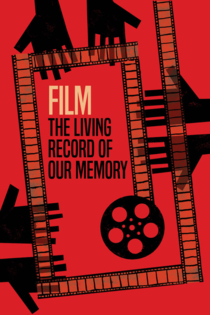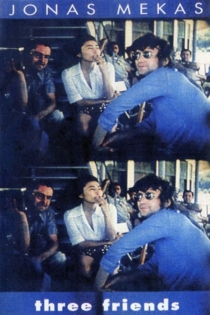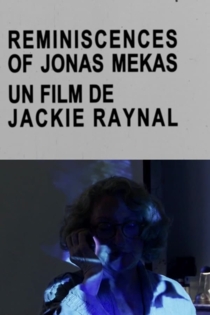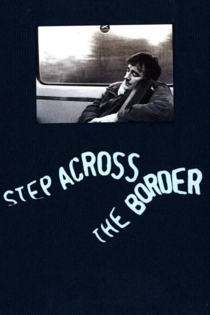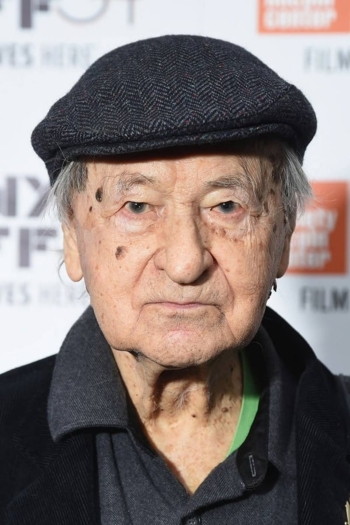
Jonas Mekas
1922 - 2019Two months after his arrival in New York he borrowed money to buy his first Bolex camera and began to record brief moments of his life. He soon got deeply involved in the American Avant-Garde film movement. In 1954, together with his brother, he started Film Culture magazine, which soon became the most important film publication in the US. In 1958 he began his legendary Movie Journal column in the Village Voice. In 1962 he founded the Film-Makers' Cooperative, and in 1964 the Film-Makers' Cinematheque, which eventually grew into Anthology Film Archives, one of the world's largest and most important repositories of avant-garde cinema, and a screening venue.
During all this time he continued writing poetry and making films. To this date he has published more than 20 books of prose and poetry, which have been translated into over a dozen languages. His Lithuanian poetry is now part of Lithuanian classic literature and his films can be found in leading museums around the world. He is largely credited for developing the diaristic forms of cinema. Mekas has also been active as an academic, teaching at the New School for Social Research, the International Center for Photography, Cooper Union, New York University, and MIT.
Mekas' film The Brig was awarded the Grand Prize at the Venice Film Festival in 1963. Other films include Walden (1969), Reminiscences of a Journey to Lithuania (1972), Lost Lost Lost (1975), Scenes from the Life of Andy Warhol (1990), Scenes from the Life of George Maciunas (1992), As I was Moving Ahead I saw Brief Glimpses of Beauty (2000), Letter from Greenpoint (2005), Sleepless Nights Stories (2011) and Out-takes from the Life of a Happy Man. In 2007, he completed a series of 365 short films released on the internet -- one film every day -- and since then has continued to share new work on his website.
Since 2000, Mekas has expanded his work into the area of film installations, exhibiting at the Serpentine Gallery, the Centre Pompidou, Musée d'Art moderne de la Ville de Paris, the Moderna Museet (Stockholm), PS1 Contemporary Art Center MoMA, Documenta of Kassel, the Museum Ludwig in Cologne, the State Hermitage Museum in St. Petersburg, and the Venice Biennale.
Poem Posters
Charles Henri Ford
William S. Burroughs, Charles Henri Ford
... with real-life portraits of Jayne Mansfield, Frak O'Hara, Ruth Ford, Ned Rorem, Virgil Thomson, Claes Oldenburg, Roy Lichtenstein, William Burroughs, Andy Warhol, Rudy Gernreich, Jonas Mekas and others.
Poem Posters
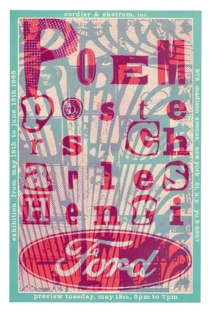
New York Conversations
Pierre-Paul Puljiz
Jonas Mekas, Ultra Violet
New York Conversations is a documentary made of varied conversations revolving around cinema in New York. These conversations give us the opportunity to sketch some of the bad boys and girls -directors, actors or producers of New York cinema, whether they be famous, anonymous or blossoming talents. Young and impetuous for most, they are watched over by a few veterans. All share this iron will to remain independent, out of choice but above all, out of necessity. The necessity to create at any cost. Shot with a Super8 camera, this documentary groups together 15 short conversations about film making, life, independence, art and...New York.
New York Conversations
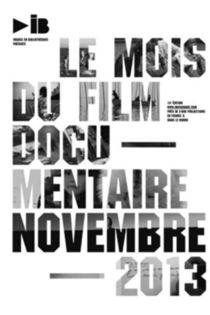
George
Jeffrey Perkins
Yōko Ono, Jonas Mekas
In 1961 Lithuanian American artist and impresario George Maciunas established the avant-garde art movement Fluxus. George details the rise of Fluxus following a sensationalized tour of “concerts” in Europe in 1962, and continuing in New York for most of the 1960s and ’70s. During this time Maciunas was converting the dying industrial buildings of Soho into a network of artists’ lofts, creating one of the first official real estate co-ops of artist-owned buildings. Maciunas’s life and legacy—as recounted by artists of his generation, including Yoko Ono and Jonas Mekas—ignited debates that remain pivotal to artists working today.
George: The Story of George Maciunas and Fluxus
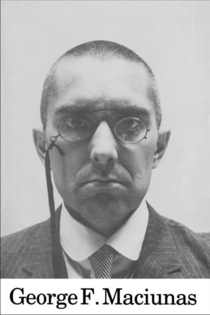
Mes entretiens filmés
Boris Lehman
François Albéra, Jean-Marie Buchet
This distinctly personal journey into the artistic possibilities of independent film is not to be missed. Jonas Mekas, Jean-Pierre Gorin, Robert Kramer and many other visionaries and mavericks of the silver screen – as well as a book seller, a critic and a psychoanalyst – discuss what cinema has meant to them, what it is and what it could be and, implicitly, how it has changed over the 18 years in which this film was shot. Director Boris Lehman leads the charge, drawing in moments of absurdist humour and inventive camera work; he keeps things raw and spontaneous. His encounters with the now much-missed Jean Rouch and Stephen Dwoskin are particularly touching and stand testament to their personal playfulness and candour. An engaging, absorbing, epic odyssey of a movie.
My Conversations on Film
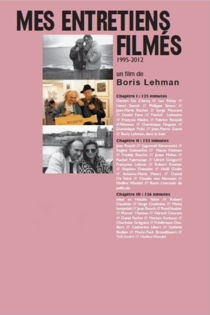
A Poet from the Lower East Side
Gyula Gazdag
Allen Ginsberg, Jonas Mekas
Filmmaker Gyula Gazdag's fascinating documentary follows Hungarian poet, playwright and activist István Eörsi on a trip to the streets of New York to visit his friend and contemporary, the iconic beat poet Allen Ginsberg. Shot just two years before Ginsberg's death, the film follows the two friends as they share poetry and laughs, wandering the streets of the Lower East Manhattan, musing about the past and contemplating the future.
A Poet from the Lower East Side
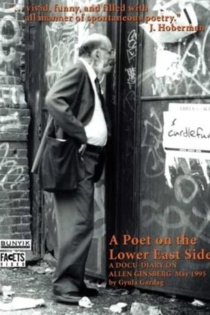
The Definition of Insanity
Frank Matter, Robert Margolis
Robert Margolis, Kelli Barnett
Co-director Robert Margolis stars as Robert, an actor who may or may not be himself in this intense and often hilarious film about acting, aging and the dark side of ambition. Blurring the line between fact and fiction, The Definition of Insanity was filmed over the course of 18 months, as a documentary crew follows Robert Margolis obsessively from one failed audition to another, recording in raw detail his every humiliation and small triumph as he searches for that elusive perfect role that will catapult his career into the next level. Just when it seems that he will be forced by family and financial pressures to give up everything he has worked for, he meets legendary filmmaker Peter Bogdanovich («The Last Picture Show», «Papermoon»). That encounter changes his life profoundly, but in a very different way than he had anticipated.
The Definition of Insanity
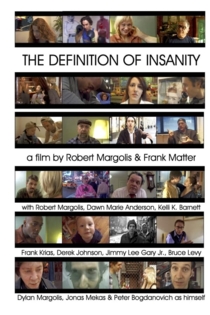
Beyond the Bolex
Alyssa Bolsey
Jacques Bolsey, Wim Wenders
Filmmaker Alyssa Bolsey stumbles on a treasure trove of vintage cameras, old film reels, fading photos, technical drawings and boxes of documents that belonged to her great-grandfather Jacques Bolsey. Among the many boxes, she spots an old movie camera with the word "Bolex" embossed on its side and a dangling tag with the date, "1927." Entranced, she embarks on a journey to reveal how Jacques aimed to disrupt the early film industry with a motion picture camera for the masses.
Beyond the Bolex
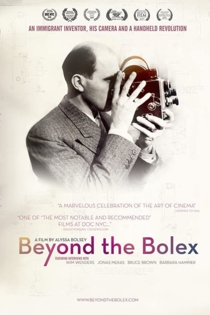
Going Home
Adolfas Mekas, Pola Chappelle
Pola Chapelle, Adolfas Mekas
A home movie by Adolfas Mekas and wife Pola Chapelle on their travels to Lithuania and Europe. It was filmed concurrently with the more highly regarded “Reminiscences of a Journey to Lithuania” by Jonas Mekas, brother to Adolfas.
Going Home
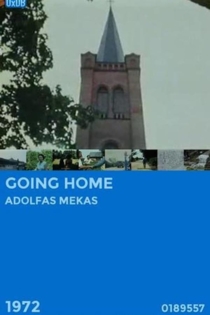
Galaxie
Gregory J. Markopoulos
Parker Tyler, Storm De Hirsch
In March and April of 1966, Markopoulos created this filmic portrait of writers and artists from his New York circle, including Parker Tyler, W. H. Auden, Jasper Johns, Susan Sontag, Storm De Hirsch, Jonas Mekas, Allen Ginsberg, and George and Mike Kuchar, most observed in their homes or studios. Filmed in vibrant color, Galaxie pulses with life. It is a masterpiece of in-camera composition and editing, and stands as a vibrant response to Andy Warhol's contemporary Screen Tests.
Galaxie
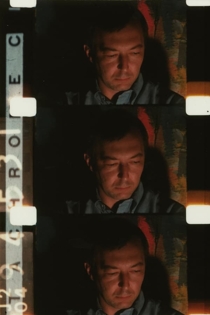
As I Was Moving Ahead Occasionally I Saw Brief Glimpses of Beauty
Jonas Mekas
Jonas Mekas, Stan Brakhage
A compilation of over 30 years of private home movie footage shot by Lithuanian-American avant-garde director Jonas Mekas, assembled by Mekas "purely by chance", without concern for chronological order.
As I Was Moving Ahead Occasionally I Saw Brief Glimpses of Beauty
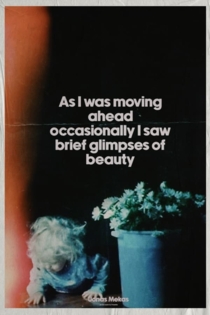
Out-Takes from the Life of a Happy Man
Jonas Mekas
Jonas Mekas
"A motion picture composed of brief diaristic scenes not used in completed films from the years 1960-2000; and self-referential video footage taped during the editing. Brief glimpses of family, friends, girl-friends, the City, seasons of the year, travels. Occasionally I talk, reminisce, or play music I taped during those earlier years, plus more recent piano improvisations by Auguste Varkalis. It's a kind of autobiographical, diaristic poem, celebration of happiness and life. I consider myself a happy man." - Jonas Mekas
Out-Takes from the Life of a Happy Man
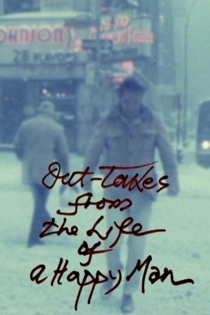
Film, the Living Record of our Memory
Inés Toharia Terán
Ann Adachi-Tasch, Margaret Bodde
Why are we still able, today, to view images that were captured over 125 years ago? As we enter the digital age, audiovisual heritage seems to be a sure and obvious fact. However, much of cinema and our filmed history has been lost forever. Archivists, technicians and filmmakers from different parts of the world explain what audiovisual preservation is and why it is necessary. The documentary is a tribute to all these professionals and their important work.
Film, the Living Record of Our Memory
